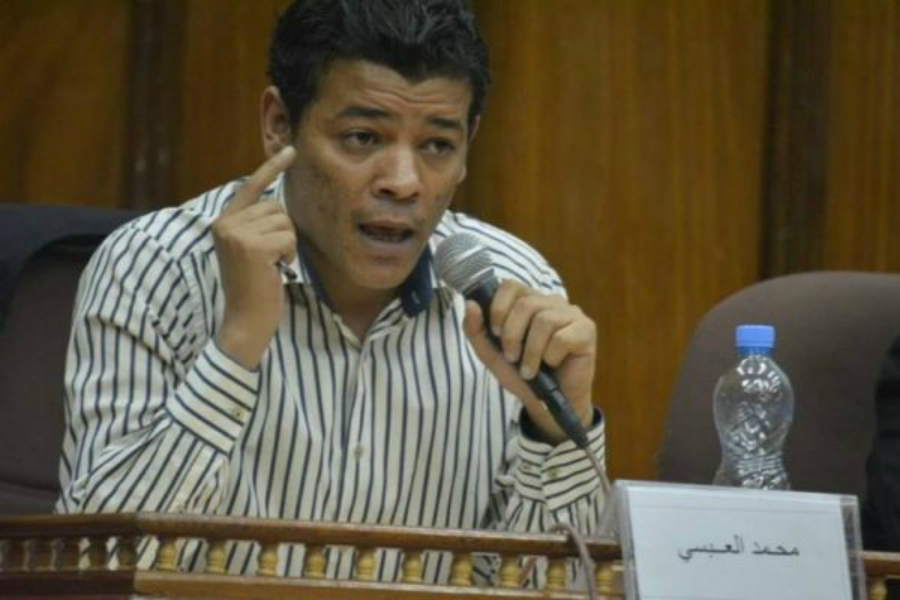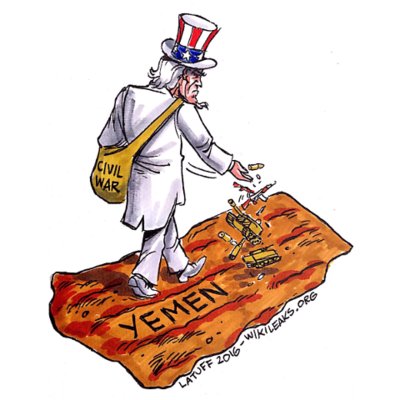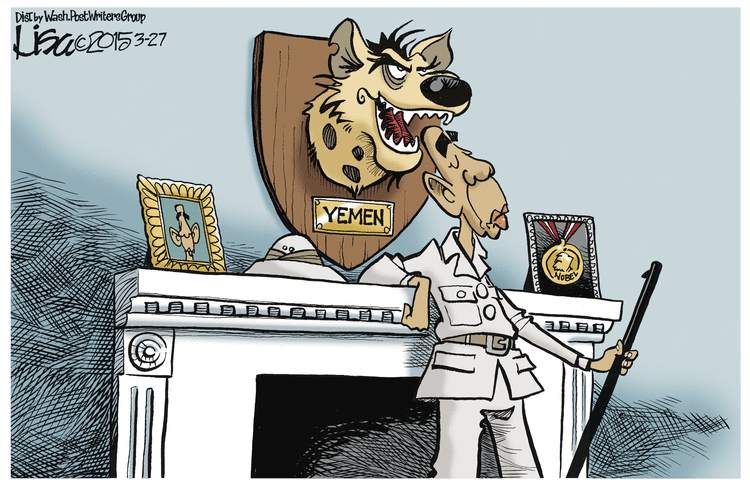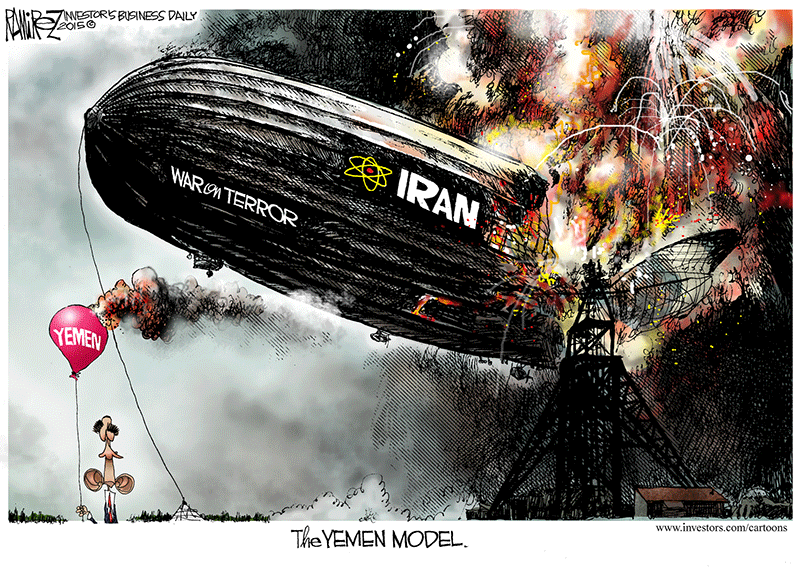Al-Qaeda leader says his group fought alongside US-backed forces.The leader of al-Qaeda in the Arabian Peninsula (AQAP) in Yemen, Qasim al-Rimi, has admitted his fighters have fought alongside Yemeni government forces currently backed by the U.S. and the Saudi-led coalition. As reported by the Washington Post, Washington regards AQAP as the deadliest branch of al-Qaeda. Al-Rimi is frequently the target of U.S. airstrikes, and there is an enormous monetary bounty for his capture. “We fight along with all Muslims in Yemen, together with different Islamic groups,” he said on Sunday to AQAP’s media arm, al-Malahem, from an undisclosed location in Yemen. Al-Rimi also added that his followers have teamed up with an array of factions — including the ultraconservative Salafis, “the Muslim Brotherhood and also our brothers among the sons of (Sunni) tribes” against Yemen’s Shiite rebels, known as Houthis. According to the Washington Post:
Admissions like these raise serious doubts about the sincerity of Washington’s prosecution of the war on terror, which was initially targeted at al-Qaeda, the terror group deemed responsible for the September 11 attacks on American soil. However, for those who have been paying attention to the conflict in Yemen over the past few years, it hardly comes as any surprise; the Saudi-led coalition has inflicted widespread suffering on Yemen — committing an extensive list of war crimes in the process — with the aim of defeating al-Qaeda’s sworn enemy. Saudi Arabia has paid little regard to the fact that AQAP and ISIS are sitting directly on its border. Further, even though Washington regards AQAP as the deadliest branch of al-Qaeda, Washington’s air strikes have killed far more civilians than AQAP has. (Washington is deadlier than the most murderous branch of al-Qaeda). This pattern of fighting alongside al-Qaeda when it suits America’s warped foreign policy interests has permeated a number of conflicts throughout the region. In Libya, the U.S. knew full well they were providing air cover for al-Qaeda-linked rebels in 2011. Hillary Clinton’s leaked emails are a testament to this fact. In Syria, al-Qaeda (no matter how many times it is rebranded) is one of the most prominent rebel groups in the country, receiving all manner of support from the U.S. and its allies in order to topple Syria’s secular government. For some, the news that an al-Qaeda leader went on record to say he has fought alongside the U.S. will be an incredible shock. For anyone else paying attention to Obama’s eight years of world wide destruction… we knew it all along. |
Tag: Yemen
Yemeni Journalist Poisoned After Investigating Oil Company And Government Corruption
Yemeni journalists are demanding justice after 35 year-old reporter Mohammed Abdu Al-Absi was found to have been poisoned to death during a controversial investigation
Evidence has now come forward proving that journalist Mohammed Abdu al-Absi had been poisoned, leading to his untimely death late last year. Al-Absi was investigating oil companies owned by members of the Houthi leadership, and had also recently published a series of reports with evidence of corrupt government activities in energy and weapons transactions. Given the sudden and mysterious circumstances of al-Absi’s death, family and the Yemeni Journalists Union filed a complaint with the Attorney General, demanding an autopsy of the body. Burial was postponed for nearly three weeks while samples were flown to Jordan for testing. The issued medical report have revealed that the death of 35-year-old al-Absi was a direct result of poisoning.
The journalist died unexpectedly of heart failure on Dec. 20, 2016 while en route to a city hospital. The same night, he had met his cousin for dinner in the capital city. Both al-Basi and his cousin fell ill, vomiting blood. Al-Basi passed away quickly while his cousin survived after being treated in the intensive care unit. Al-Absi was a well-recognized journalist within Yemen, having worked for several political publications and having founded the National Coalition Against the LNG deal in 2010. He also wrote actively on his blog and published a collection of poems titled “a drop when alone, a rain when together” through the Azmena Publishing House in Amman.
“We are troubled by the passing of Mohamed al-Absi in such unclear circumstances and support his family and the Yemeni Journalists Syndicate in their demands for a serious and independent investigation in the case as well as an autopsy by a doctor representing the union to clarify the cause of his death,” stated Phillippe Leruth, President of the International Federation of Journalists (IFJ), Philippe Leruth, who has teamed up with the Yemeni Journalists Syndicate (YJS) to seek justice on behalf of al-Absi. The Union requested the autopsy be performed by an international committee headed by the Red Cross.
A statement released by the Information Ministry expressed “In the days before his death, the journalist al-Absi, who was working in one of the Ministry’s institutions before the coup, was working on a statistical investigations on serious issues and documents that condemn the coup makers, especially documents related to oil and arms”. Al-Basi had reportedly been exploring suspicions of energy companies operating on the black market. Following his assassination, activists published documents found in his possession that suggested that Houthi spokesman Mohammed Abdul Salam owns an oil company involved in illegal activities in Houthi-controlled areas of the country.
Al-Absi’s biography on the Gulf Pulse reads “Mohamed Abdu al-Absi is a journalist who was tried in Yemen after the Arab Spring in 2012, by the political wing affiliated with the Yemeni Muslim Brotherhood. He is an anti-corruption activist, a writer and poet, and founder and president of the alliance to fight illegal government deals”.
By
WikiLeaks Releases The Yemen Files
The Yemen Files: evidence of the US arming, training and funding of Yemeni forces
From Wikileaks:
25 November, 2016
Today, Friday 25th November, WikiLeaks releases The Yemen Files.
The Yemen Files are a collection of over 500 documents from the United States embassy in Sana’a, Yemen. Comprising of over 200 emails and 300 PDFs, the collection details official documents and correspondence pertaining to the Office for Military Cooperation (OMC) located at the US embassy. The collection spans the period from 2009 until just before the war in Yemen broke out in earnest during March 2015. This time covers both Hillary Clinton’s term as Secretary of State (2009-2013) and the first two years of Secretary John Kerry.
Julian Assange said: “The war in Yemen has produced 3.15 million internally displaced persons. Although the United States government has provided most of the bombs and is deeply involved in the conduct of the war itself reportage on the war in English is conspicuously rare.”
Yemen is of significant strategic interest as Yemen controls a narrow choke point to the Red Sea and the Suez Canal through which 11% of the world’s petroleum passes each day. In addition Yemen borders Saudi Arabia (to the north) and Oman (to the east) and has access to the Arabian Sea through which another 20% of the world’s petroleum passes from the Strait of Homuz (including the oil of Saudi Arabia and Iran). Saudi Arabia seeks to control a port in Yemen to avoid the potential constriction of its oil shipments by Iran along the Straight of Homuz or by countries which can control its other oil shipment path along the Red Sea.
The Yemen Files offer documentary evidence of the US arming, training and funding of Yemeni forces in the years building up to the war. The documents reveal, among other things, procurement of many different weapon types: aircrafts, vessels, vehicles, proposals for maritine border security control and Yemeni procurement of US biometric systems.
US presence remained in the country until February 2015 when the US closed its embassy due to the continuing unrest between different factions in the country. The war broke out a month later.
RELEASE: The #Yemen Files #HillaryClinton #YemenCrisis #Saudi #Iran #ISIL #AQAP #RedSea https://t.co/kTLYWhGMBF #yemencrisis pic.twitter.com/LjzvkAQxG2
— WikiLeaks (@wikileaks) November 25, 2016




